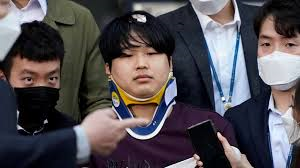Seoul, South Korea (AP)- South Korean prosecutors began reviewing whether to formally charge a man arrested last week on allegations that he operated secret chatrooms where he posted sexually abusive videos of blackmailed women in return for cryptocurrency payments.
The allegations have triggered an intense public uproar and soul-searching over a culture that critics say is lenient about sexual violence and continuously fails the victims, prompting President Moon Jae-in to call for an investigation and stern punishment for operators of such chatrooms and their users.
Cho Ju-bin, 24, was paraded before journalists at the Jongno Police Station in Seoul before officers drove him to the prosecutors’ office. Police officers created a perimeter around the station’s gate to block off angry protesters, who waved signs that read “From chatroom to prison” and “Punish all users” and yelled, “Give him the highest penalty!” “Thank you for stopping the life of a devil (I) couldn’t stop,” Cho said in front of a barrage of camera flashes.
He refused to answer questions about the accusations against him but offered apologies to a former mayor of Gwangju City, for allegedly attempting to blackmail the JTBC president for reasons that weren’t immediately clear. Police said they currently don’t have any knowledge linking the three men with the chatrooms.
Before sending Cho’s case to prosecutors, police said they had arrested 18 people since September while investigating private chatrooms on the Telegram messaging app, where users paid in cryptocurrency to view videos of a sexual nature that involved dozens of allegedly blackmailed women and girls.
Los Angeles, CA (AP News)-Imprisoned for conspiring to slip their children into USC as bogus water polo stars, a Napa Valley vintner and a Los Angeles water systems executive asked a judge last week to release them from custody early, citing the specter of the novel Coronavirus.
Agustin Huneeus Jr., whose family owns several wineries in Napa, was discharged on March 17, two weeks before his five-month term was over after U.S. District Judge Indira Talwani found that “extraordinary and compelling reasons” justified the early release.
Incarcerated in Lompoc, Devin Sloane, whose four-month prison term will end April 1, asked Talwani for similar relief and was denied. Even as she turned down the request, Talwani suggested that the process prisoners must follow to seek early release is ill-equipped to address a fast-moving crisis forced on the courts and prison system by the Coronavirus outbreak.
Sloane, she wrote, failed to demonstrate he had appealed to the warden at Lompoc and exhausted all administrative means of securing an early release before appealing to the court. Nor had he shown a “life-threatening condition” that would allow him to bypass those avenues and go directly to the court, she wrote.
Talwani raised in her order what she called “a critical question”: Should Congress or President Trump give the courts or the Bureau of Prisons “greater flexibility” to truncate the prison terms of people imprisoned for nonviolent crimes who are nearing the ends of their sentences?
Amid a pandemic that has upended courts across the country and unnerved prisoners and their advocates, it is no surprise the Coronavirus has affected the cases of dozens of parents charged with defrauding USC, Georgetown and other elite universities with rigged entrance exams, fabricated credentials, and bribes.
But compared with the disarray brought on the criminal justice system writ large, the pandemic’s effect has been more blunted on the college admission’s cases. Every defendant who has pleaded not guilty was allowed to post bond and remains out of custody ahead of trial. The first trial that includes Lori Loughlin, her husband, J. Mossimo Giannulli, and six other parents remains scheduled to begin Oct. 5.
Singapore (AP NEWS)- Singapore’s stimulus package is the most aggressive response to the pandemic by an Asian government so far. Singapore unveiled an unprecedented stimulus plan worth around $48 billion (US$33.7 billion) to deal with the economic fallout of the Covid-19 pandemic, with the government tapping its vast reserves for only the second time in history to deal with what is likely to be a deep recession.
The move is the most aggressive response yet by an Asian government to the pandemic, which has brought economic activity to a near standstill as nearly a third of humanity is currently in some form of lockdown as authorities scramble to minimize fatalities.
“Today, I will introduce measures worth over $48 billion in this ‘Resilience Budget’, to deal decisively with the situation at hand,” Deputy Prime Minister and finance minister Heng Swee Keat said in an address to lawmakers in parliament. “This is a landmark package, and necessary response to a unique situation.”
The unprecedented drawdown of $17 billion from the national reserves has been granted “in-principle” approval by President Halimah Yacob, said Heng, who is slated to succeed Prime Minister Lee Hsien Loong sometime after the general election that is expected to be called in the coming months.
Before Heng’s speech, Speaker of Parliament Tan Chuan-Jin read prepared remarks by Halimah. The president said she gave the green light to the proposal “considering the grave circumstances, and highly uncertain outlook.”



